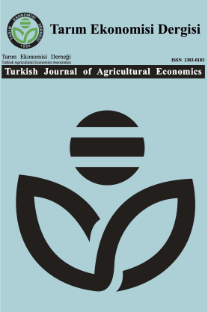The Role of Producers’ Markets in Empowering Rural Women
Kırsaldaki Kadınların Güçlendirilmesinde Üretici Pazarlamanın Rolü
___
Adanacıoğlu, H. 2017. Doğrudan Pazarlama Stratejisinde Kiraz Üreticilerinin Pazarlama Etkinliği. Balkan ve Yakın Doğu Sosyal Bilimler Dergisi, 3(1): 1-11.Arıkan, G. 1988. Kırsal Kesimde Kadın Olmak. Hacettepe Üniversitesi Edebiyat Fakültesi Dergisi, 5(2): 1-16.
Brown, C. and Stacy M. 2008. The Impacts of Local Markets: A Review of Research on Farmers Markets and Community Supported Agriculture (CSA). American Journal of Agricultural Economics, 90(5): 1298-1302.
Damisa, M. A. and Yohanna, M. 2007. Role of Rural Women in Farm Management Decision Making Process: Ordered Probit Analysis. World Journal of Agricultural Sciences, 3(4): 543-546.
Demir, P. A., Elmalı, D. A. and Işık, S. A. 2017. Kırsal Alanda Kadınların Tarım ve Hayvancılık Faaliyetlerine İlişkin Sosyo-Ekonomik Katkısı. İstanbul Üniversitesi Veteriner Fakültesi Dergisi, 43(2): 81-88.
Farma. 2011. Fact Sheet. Accessed 10.09.2019.
Feenstra, G. W., Lewis, C. C., Hinrichs, C.C., Gillespie, G.W. and Hilchey, D. 2003. Entrepreneurial Outcomes and Enterprise Size in US Retail Farmers’ Markets. American Journal of Alternative Agriculture, 18(1): 46–55.
Govindasamy, R., Zurbriggen, M., Italia, J., Adelaja, A., Nitzsche, P. and VanVranken, r. 2002. Farmers' Markets: Consumer Trends, Preferences, and Characteristics. Journal of Extension, 40(1): 1-7.
Guthman, J. 2008. Bringing Good Food to Others: Investigating the Subjects of Alternative Food Practice. Cultural Geographies, 15(4): 431-447.
Hablemitoğlu, Ş. 1998. Kırsal Alanda Kadınlar ve Sürdürülebilir Gıda Güvenliği. Tarım ve Köy Dergisi, 123: 32-35.
Holloway, L. and Kneafsey, M. 2000. Reading the Space of the Farmers' Market: A Preliminary Investigation from the UK. Sociologia Ruralis, 40(3): 285-299.
Hunt, A. R. 2007. Consumer Interactions and Influences on Farmers’ Market Income. Renewable Agriculture and Food Systems, 22(1): 54–66.
Kieran, C., Gray, B. and Gash, M. 2017. Understanding Gender Norms in Rural Burkina Faso: A Qualitative Assessment. Grameen Foundation, 59. Retrieved from https://grameenfoundation.org/documents/Understanding_Gender_Norms_Baseline_Qualitative_Assessment_BRB.pdf
Kirwan, J. 2004. Alternative Strategies in the UK Agro-food System: Interrogating the Alterity of Farmers’ Markets. Sociologia Ruralis, 44(4): 395-415.
Li, K., Weidhaas, J., Lemonakis, L., Khouryieh, H., Stone, M., Jones, L. and Shen, C. 2017. Microbiological Quality and Safety of Fresh Produce in West Virginia and Kentucky Farmers’ Markets and Validation of a Post-harvest Washing Practice with Antimicrobials to Inactivate Salmonella and Listeria Monocytogenes. Food Control, 79:101-108.
Marçal, K. 2018. Adam Smith’in Yemeğini Pişiren Kim? Ekonomide Kadının Görünmez Eli. İstanbul, Koç Üniversitesi Yayınları.
Martinez, S., Hand, M., Da Pra, M., Pollack, S., Ralston, K., Smith, T., Vogel, S., Clark, S., Lohr, L., Low, S. and Newman, C. 2010. Local Food Systems: Concepts, Impacts, and Issue. USDA Economic Research Report. 97.
Mazoyer, M. and Roudart, L. 2006. A History of World Agriculture. From the Neolithic Age to the Current Crisis. New York: Monthly Review Press.
Meinzen-Dick, R., Rubin, D., Elias, M., Mulema, A. A. and Myers, E. 2019. Women’s Empowerment in Agriculture: Lessons from Qualitative Research. Vol. 1797. The International Food Policy Research Institute (IFPRI) Discussion Paper.
Patton, M. Q.. 1987. How to Use Qualitative Methods in Evaluation. CA: Sage Publications.
Payne, T. 2002. U.S. Farmers’ Markets 2000: A Study of Emerging Trends. Journal of Food Distribution Research, 33(1): 1-3.
Pujol, M. A. 1992. Feminism and Anti-Feminism in Early Economic Thought. Books: Edward Elgar Publishing.
Rosada, I. 2016. A Review on Multi-roles of Women and Their Influence on the Change of Functional Structure in the Farmer’s Household. Agriculture and Agricultural Science Procedia, 9: 47–53.
Sarıtaş, S. 2017. As Market Sellers and Villagers, the Aspect of Women from the Socıo-economıc Perspective. International Journal of Eurasia Social Sciences, 8(27): 576-587.
Serçinoğlu, O. and Bektaş. V. 2014. Ülkemizde Yaş Meyve, Sebze ve Süt Ürünleri Pazarlama Kanalları İçinde Küçük Aile İşletmelerinin Yeri ve Üretici Pazarları Modelinin Değerlendirilmesi. Ulusal Aile Çiftçiliği Sempozyumu, (October 30-31, Ankara).
Serdaroğlu, U. 2010. Feminist İktisat’ın Bakışı Postmodenist mi? Ankara: Eflatun Basım Dağıtım Yayıncılık.
Uraz, A., Aran, M., Hüsamoğlu, M., Şanalmış, O. D. and Çapar, S. 2010. Türkiye’de Kadınların İş gücüne Katılımında Son Dönemde Gözlenen Eğilimler.” T.C. Devlet Planlama Teşkilatı ve Dünya Bankası, Refah ve Sosyal Politika Analitik Çalışma Programı Çalışma Raporu. 2. 75443. Ankara.
Varner, T. and Otto, D. 2008. Factors Affecting Sales at Farmers’ Markets: An Iowa Study. Review of Agricultural Economics, 30(1): 176–189.
Vecchio, R. 2009. European and United States Farmers’ Markets: Similarities, Differences and Potential Developments. European Association of Agricultural Economists (EAAE), (September 3-6, Crete).
Wolf, M. M., Spittler, A. and Ahern, J. 2005. A Profile of Farmers' Market Consumers and the Perceived Advantages of Produce Sold at Farmers' Markets. Journal of Food Distribution Research, 36(1): 192-201.
Yavuz, F., Shivan, M. S., Terin, M., Akay, B., Güler, İ. O. and Ağsu, K. 2018. Gelir Getirici Faaliyetlere Karar Vermede Kırsal Kadının Rolü: Kuzeydoğu Anadolu TRA1 Bölgesi Örneği. UİİİD –IJEAS Special Issue :1-10.
Yuliati, Y. 2008. The Ecologic Change and Strategy of Social Adaptation at the Upland of Tengger (Perubahan Ekologis dan Strategi Adaptasi Masyarakat di Wilayah Pegunungan Tengger): An Environmental Review on Gender-Perspective. PPS UNIBRAW/S3. University of Brawijaya.
- ISSN: 1303-0183
- Yayın Aralığı: Yılda 2 Sayı
- Başlangıç: 1992
- Yayıncı: Tarım Ekonomisi Dergisi
Kırsaldaki Kadınların Güçlendirilmesinde Üretici Pazarlamanın Rolü
Alaiddin KOŞAR, Sevgi Tüzün RAD
Sığır Sütü Fiyatı le Sığır Et Üretimi Arasında Bir Bağlantı Var mı? Türkiye'den Amipirk Bulgular
Is There Any Link Between Cattle Milk Price and Beef Production? Empirical Evidence from Turkey
Uluslararası Tarımsal Kalkınma Fonu ve Türkiye Uygulamalarının Değerlendirilmesi
The Role of Producers’ Markets in Empowering Rural Women
Sevgi TÜZÜN RAD, Alaiddin KOŞAR
Sığır Sütü Fiyatı ile Sığır Eti Üretimi Arasında Bir Bağlantı Var mı? - Türkiye'den Ampirik Kanıtlar
Çiftçilerin Girdi Temini ve Tarımsal Ürün Pazarlaması Konusundaki Yaklaşımları Üzerine Bir Araştırma
Onur TERZİ, M. Metin ARTUKOĞLU
Türkiye’de Kırdan Kente Göç-İşsizlik: Todaro Paradoksu
Ahmet ŞAHİN, Erkan AKTAŞ, Sevgi TÜZÜN RAD
Kırsaldaki Kadınların Güçlendirilmesinde Pazarlamanın Rolü
Sevgi TÜZÜN RAD, Alaiddin KOŞAR
